Karen Buckley: The student who 'didn't get to come home'
- Published
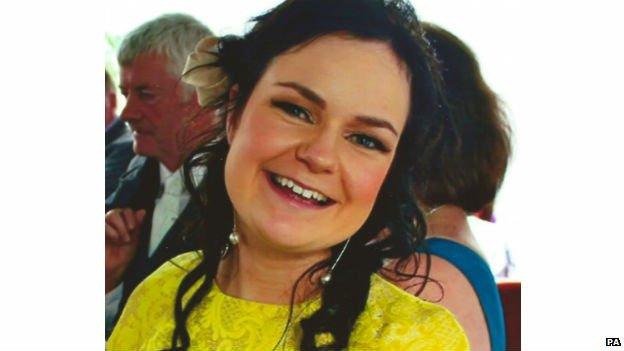
Karen Buckley went missing in April after a night out with friends in Glasgow
In April this year, 24-year-old Irish student Karen Buckley did what thousands of students across the country do on a Saturday night.
She got dressed up - in a black jumpsuit and red high heels - had a few drinks with friends and headed to a nightclub in Glasgow, the city where she was at university studying to become an occupational therapist.
However, hours later she disappeared from the nightclub after telling friends she was going to the toilet.
She did not take her jacket. CCTV showed her talking to a man outside Sanctuary in the city's west end in the early hours of Sunday morning then heading away from the club.
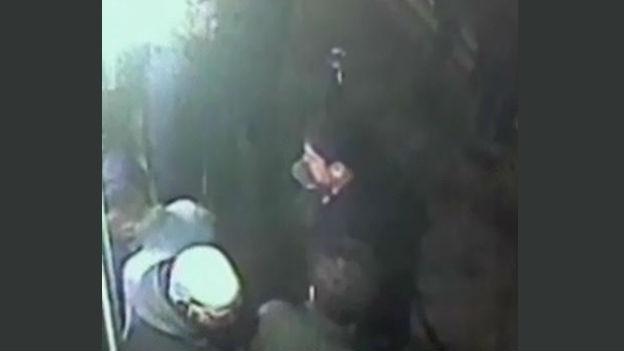
CCTV showed Alexander Pacteau outside the Sanctuary nightclub
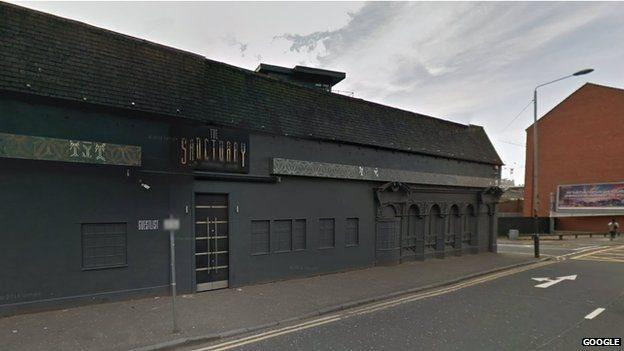
Karen was seen on CCTV leaving the Sanctuary nightclub in Glasgow
A missing person inquiry was launched with officers eager to trace the man Karen had been seen with.
Her parents flew over from their home in Cork.
As they made an emotional plea for her safe return during a press conference in Glasgow, Karen's handbag was discovered in the city's Dawsholm Park.
Her mum, Marian, told reporters: "She is our only daughter and we love her dearly.
"We just want Karen home safely. We are desperate."
Back near her home in Mallow a special prayer service was held for Karen, and a fundraising page was set up by her former classmates to support her family.
Ireland's minister for foreign affairs, Charlie Flanagan, said the thoughts and prayers of everyone in the country were with the Buckleys.
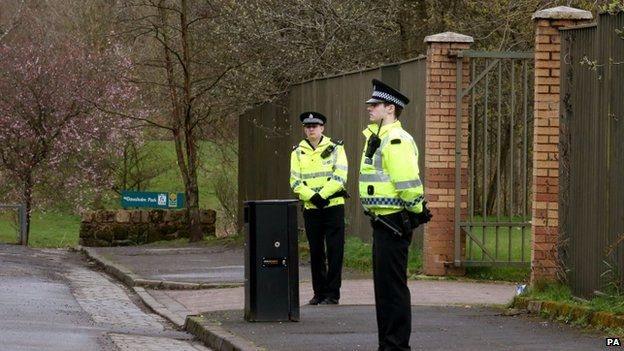
Karen's bag was found in a park in Glasgow

Meanwhile extensive searches were being carried out at the park where her bag was found and a flat in the city's Kelvinside area.
Police had by now revealed that they believed Karen had gone back to a flat and spent time there after leaving the nightclub.
They also said the man they had been keen to speak to had come forward - but insisted he was not a "suspect" at this stage.
It's now known that man was 21-year-old Alexander Pacteau.
Karen did not go back to his flat after their meeting outside the club. Instead he drove her to nearby Kelvin Way.
His car was parked on the street for 12 minutes, during which time Pacteau attacked and murdered her by grabbing her neck and hitting her with a spanner.
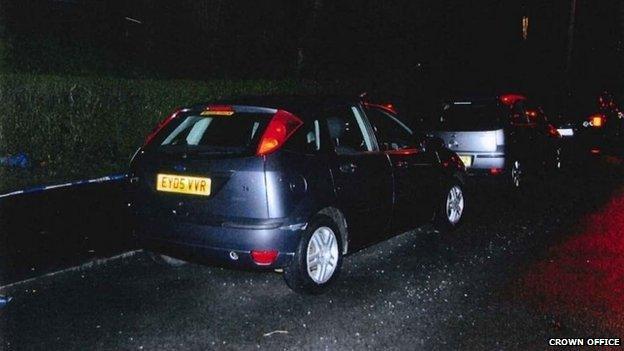
Pacteau killed Karen in his car a short time after she was seen leaving the club
His silver Ford Focus was seen on CCTV leaving the area and heading towards the park where her bag was found.
Pacteau then drove to his flat and left Karen's body in his room. At about 08:00 he used his phone to look up information on caustic soda on the internet, then went to B&Q and Poundstretchers where he bought litres of the chemical and masks and gloves.
He texted his flatmate to make sure he was out for the day, then returned to the flat and left Miss Buckley's body in the bath.
When his flatmate returned he found Pacteau cleaning the hall and stairwell.
The following morning Pacteau disposed of the spanner and bought cleaning products, asking about how to remove blood from a mattress.
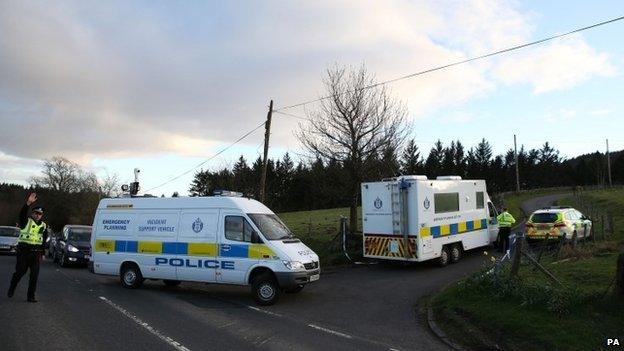
Karen's body was found at High Craigton Farm near Milngavie
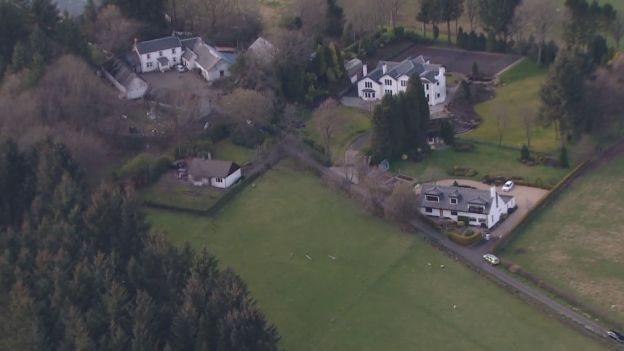
Police Scotland cordoned off land around the farm and a nearby golf course
Searches for Karen, who was also a qualified nurse, involved specialist police divers, a helicopter crew and search dogs.
Four days after her disappearance police said a body found on a farm a short drive from Glasgow, in Milngavie, was the 24-year-old student.
By now, Pacteau had been arrested and charged with her murder.
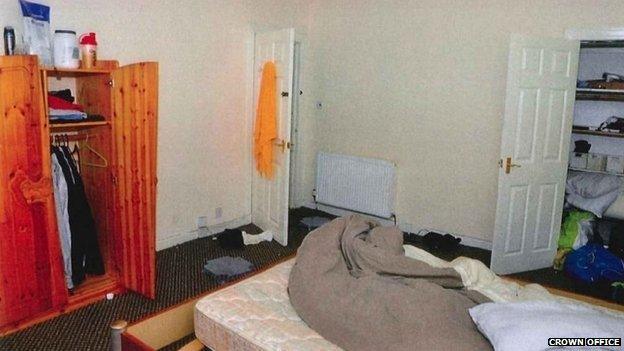
Pacteau took Karen's body back to his flat where he tried to destroy evidence
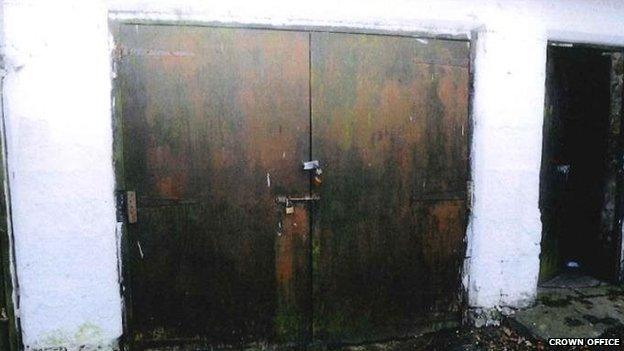
Karen's body was found in a barrel at a storage unit at the farm in Milngavie
In court, it was revealed that Pacteau knew the farm in Milngavie as he had previously rented a storage unit there.
The day after he killed Karen he went to the farm and burned clothing before returning to his flat where he put her body in a barrel he had ordered from a packaging company.
He then took the mattress in his car to the farm and burned it along with other items.
He once again returned to his flat, this time to collect the barrel.
He put the barrel in a storage unit at the farm, covering it with a sheet and placing a bike wheel and paper shredder on top.
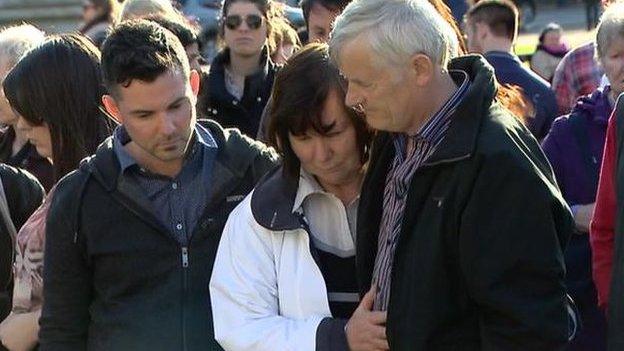
A vigil in Glasgow's George Square was attended by Miss Buckley's parents and other family members
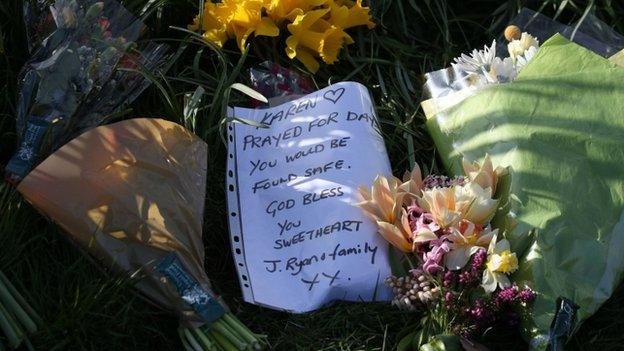
Floral tributes to Karen were at the farm where her body was found
In Glasgow - the city the Irish student had made her temporary home - after her body was found, the outpouring of grief and shock was clearly visible.
Two candlelit vigils were held, the first in the city's George Square. Karen's parents and two of her three brothers were among those who brought candles and flowers.
A second vigil was organised by the local community in Garnethill, where the Irish student had lived, to give local people a chance to remember one of their neighbours "who didn't get to come home".
Karen's body was flown home to County Cork a fortnight after she went missing. The remains were accompanied on the special flight from Glasgow by her parents and brothers.
At her funeral two days later, mourners heard she was "too young to die".
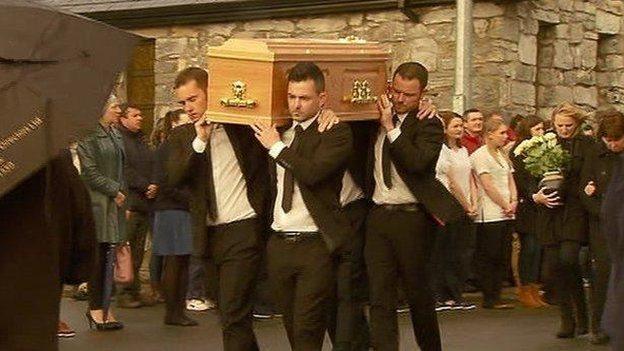
Karen's funeral was held in Analeentha in County Cork

Karen's bedroom at her parents house in Cork filled with letters sent by well-wishers after her death
Requiem Mass was celebrated by 20 priests. Reverend Joe O'Keefe said her death seemed "utterly inappropriate".
"Twenty-four years simply does not seem the right time to die - it does not seem to add up," he said.
Police officers from Scotland, who had been involved in the search for Karen, travelled to Ireland for the funeral.
Her family later thanked people in Scotland for their "huge outpouring of support and sympathy".
Her father John said: "We want to thank everybody who took part in the search for Karen and the hundreds of people who turned out for the vigil in George Square."
And he echoed the words of the priest and the thoughts of the community both in Glasgow and in Mallow.
"Karen will never have the chance to live out her life, travel more and pursue her career in occupational therapy. That maybe someday she could have a family of her own and enjoy a happy and eventful life.
"We are still in shock and disbelief, and it sometimes feels like all of this isn't real."